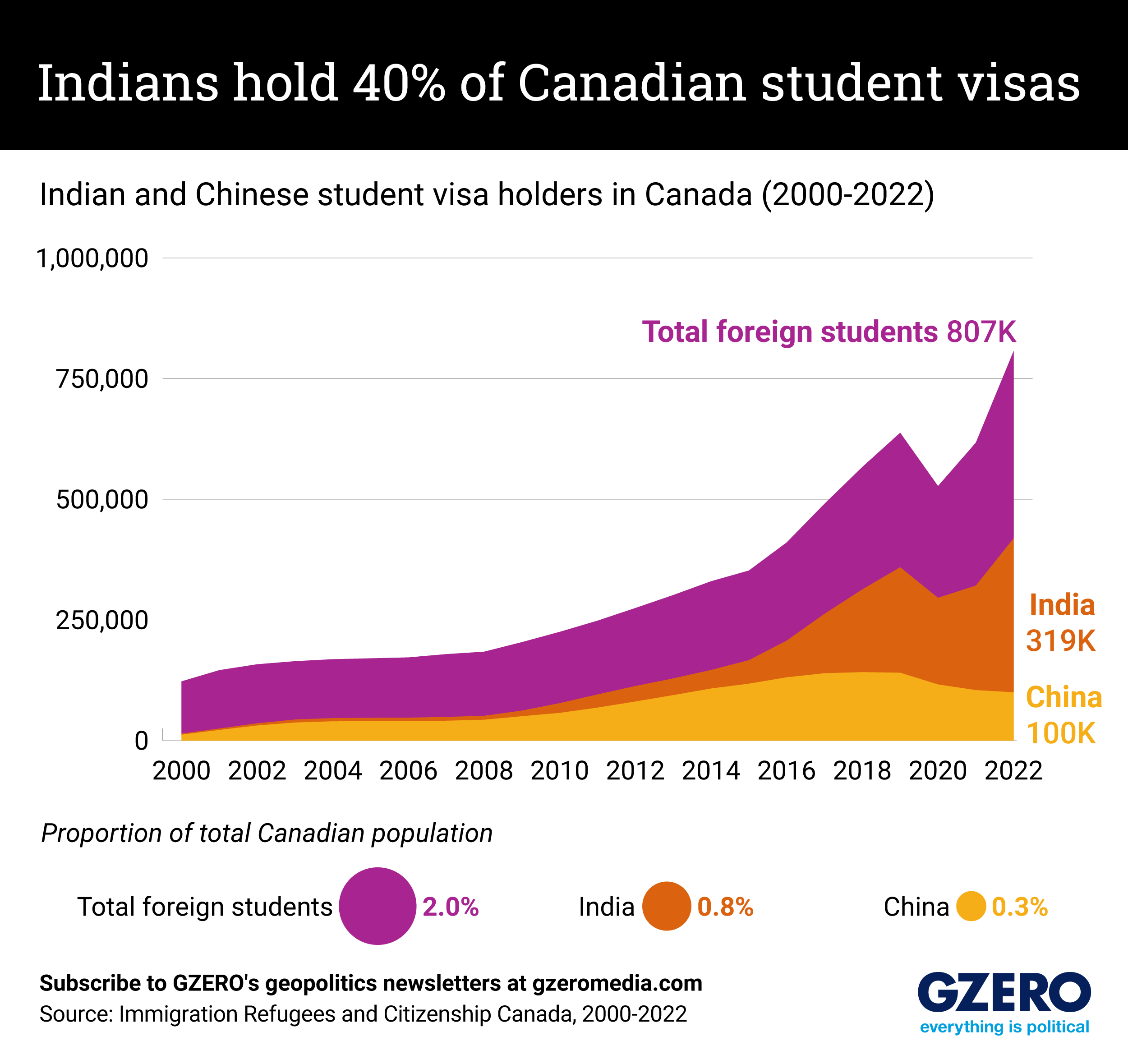September 28, 2023
The fallout from allegations that India was behind the assassination of Hardeep Singh Nijjar has thrown Indo-Canadian relations into the lurch. Each side has expelled a diplomat from the other, and India’s Embassy in Canada stopped processing visas – a serious diplomatic gesture, no doubt, but the material impacts are likely to be small. Only around 80,000 Canadians visited India in 2021 out of more than 1.5 million foreign tourists.
But if Canada responds in kind, it will be a very different story. Indian students represent a staggering 40% of the 807,000 foreign student visa holders in Canada, more than every other nationality combined save China. The number of Indians studying in the Great White North skyrocketed from just 2,210 in 2000 to 171,505 in 2018 — also the year Indian students first outnumbered Chinese students. Their population has since nearly doubled, and Indian students now represent approximately 0.8% of the entire population of Canada.
Here’s the twist: Even before the row over Nijjar’s murder, Canada was seriously considering capping student visas. The country is in the midst of a severe housing shortage, and efforts to alleviate the situation are falling short. The province of Ontario needs to build around 150,000 new houses every year for the next several years to rectify the situation — and they’re managing around 40,000. Capping the number of foreign students competing for limited housing might be politically expedient, but it would be a devastating blow to the Canadian universities that depend upon international tuition rates.
From Your Site Articles
More For You
Prime Minister Narendra Modi, with President of the European Council António Luís Santos da Costa, and President of the European Commission Ursula von der Leyen, at Hyderabad House, in New Delhi, India, on Jan. 27, 2026.
DPR PMO/ANI Photo
On Tuesday, the world’s largest single market and the world’s most populous country cinched a deal that will slash or reduce tariffs on the vast majority of the products they trade.
Most Popular
Sponsored posts
Five forces that shaped 2025
What's Good Wednesdays
What’s Good Wednesdays™, January 28, 2026
Mexican President Claudia Sheinbaum Pardo stands alongside Canadian Prime Minister Mark Carney and US President Donald Trump during the 2026 World Cup draw at the John F. Kennedy Center for the Performing Arts in Washington, D.C., on December 5, 2025.
Deccio Serrano/NurPhoto
Canadian Prime Minister Mark Carney has repeatedly tussled with US President Donald Trump, whereas Mexican President Claudia Sheinbaum has tried to placate him. The discrepancy raises questions about the best way to approach the US leader.
Fighters of the Qassam Brigades, the armed wing of the Palestinian Islamist Hamas movement, attend a rally marking the 35th anniversary of the group's foundation in Gaza City on December 14, 2022.
Photo by Majdi Fathi/NurPhoto
10,000: The number of Hamas officers that the militant group reportedly wants to incorporate into the US-backed Palestinian administration for Gaza, in the form of a police force.
Walmart is investing $350 billion in US manufacturing. Over two-thirds of the products Walmart buys are made, grown, or assembled in America, like healthy dried fruit from The Ugly Co. The sustainable fruit is sourced directly from fourth-generation farmers in Farmersville, California, and delivered to your neighborhood Walmart shelves. Discover how Walmart's investment is supporting communities and fueling jobs across the nation.
© 2025 GZERO Media. All Rights Reserved | A Eurasia Group media company.
